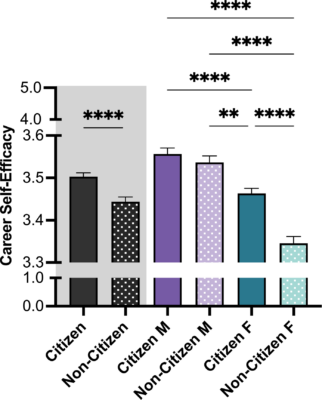International graduates and postdocs struggle with career confidence

A new study reports that international doctoral students and postdocs are less familiar with the wide array of career options where their Ph.D. skills are needed and report feeling less support from their graduate program or department than counterparts with U.S. citizenship. When feeling more supported by their graduate program or department, however, international trainees reported having higher career self-efficacy, the belief of feeling empowered to make career decisions and a conviction to be successful in a career.
“It’s important to encourage help-seeking behavior through creating inclusive professional development programs. Campus-wide solutions such as those being implemented at Cornell through our Office of Career and Professional Development in the Graduate School are important to overcome any barriers,” adds Susi Varvayanis, executive director of Careers Beyond Academia, a program within the office.
These career exploration and skill building programs and experiential opportunities can help all grad students and postdocs feel better prepared, identify good fits, and set themselves apart as top candidates.
Read the summary on Cornell’s Graduate School website.
Citizenship status and career self-efficacy: An intersectional study of biomedical trainees in the United States
D. Chatterjee, A.T. Nogueira, I. Wefes, R. Chalkley, S. Sturzenegger Varvayanis, C.N. Fuhrmann, J. Varadarajan, G.A. Jacob, C.H. Gaines, N.M. Hubbard, S. Chaudhary, R.L. Layton. (2024) PLOS ONE 19(3). DOI: https://doi.org/10.1371/journal.pone.0296246
Abstract
This study examines the intersectional role of citizenship and gender with career self-efficacy amongst 10,803 doctoral and postdoctoral trainees in US universities. These biomedical trainees completed surveys administered by 17 US institutions that participated in the National Institutes of Health Broadening Experiences in Scientific Training (NIH BEST) Programs. Findings indicate that career self-efficacy of non-citizen trainees is significantly lower than that of US citizen trainees. While lower career efficacy was observed in women compared with men, it was even lower for non-citizen female trainees. Results suggest that specific career interests may be related to career self-efficacy. Relative to US citizen trainees, both male and female non-citizen trainees showed higher interest in pursuing a career as an academic research investigator. In comparison with non-citizen female trainees and citizen trainees of all genders, non-citizen male trainees expressed the highest interest in research-intensive (and especially principal investigator) careers. The authors discuss potential causes for these results and offer recommendations for increasing trainee career self-efficacy which can be incorporated into graduate and postdoctoral training.
Read the full paper in PLOS ONE.


